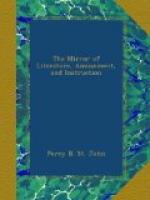“When I returned to take my breakfast, Colonel Addenbrooke came in; he said, ’I don’t know what to make of these fellows; there’s Sir Robert Gardiner swears he can’t stay in the room with it: that if he sees it in one room, he’ll go into another.’—Then there’s Dr. Short. I said, I suppose by your going out and saying nothing, you don’t like the picture. ‘Like it,’ he said, (and he was blubbering) ’’tis so like her, and so amiable, that I could not stay in the room.’—More passed on the subject, not worth detailing. I learnt that the prince was very much overcome by the sight of the picture, and the train of recollections that it brought with it. Colonel Addenbrooke went in to the prince, and returning shortly, said, ’The prince desires me to say how much obliged to you he is for this attention, that he shall always remember it. He said, ’Do you think Sir Thomas Lawrence would wish to see me? If he would, I shall be very glad to see him.’—I replied that I thought you would: so if you like, he will see you whenever you choose, before your departure.’ Soon after, I went in to him. As I passed through the hall, Dr. Short came up to me, (he had evidently been, and was crying,) and thanked me for having painted such a picture. ‘No one is a better judge than I am, sir,’ and he turned away.”
“The prince was looking exceedingly pale; but he received me with calm firmness, and that low, subdued voice that you know to be the effort at composure. He spoke at once about the picture and of its value to him more than to all the world besides. From the beginning to the close of the interview, he was greatly affected. He checked his first burst of affection, by adverting to the public loss, and that of the royal family. ’Two generations gone!—gone in a moment! I have felt for myself, but I have felt for the Prince Regent. My Charlotte is gone from this country—it has lost her. She was a good, she was an admirable woman. None could know my Charlotte as I did know her! It was my happiness, my duty to know her character, but it was my delight.’ During a short pause I spoke of the impression it had made on me. ’Yes, she had a clear, fine understanding, and very quick—she was candid, she was open, and not suspecting, but she saw characters at the glance—she read them so true. You saw her; you saw something of us—you saw us for some days—you saw our year! Oh! what happiness—and it was solid—it could not change, for we knew each other—except when I went out to shoot, we were together always, and we could be together—we did not tire.’”
“I tried to check this current of recollection, that was evidently overpowering him (as it was me) by a remark on a part of the picture, and then on its likeness to the youth of the old king. ’Ah! and my child was like her, for one so young, (as if it had really lived in childhood.) For one so young it was surprisingly like—the nose, it was higher than children’s are—the mouth,




